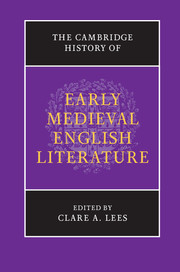Book contents
- Frontmatter
- Contents
- List of Illustrations
- List of Contributors
- Acknowledgements
- List of Abbreviations
- Introduction: literature in Britain and Ireland to 1150
- I WORD, SCRIPT AND IMAGE
- II EARLY ENGLISH LITERATURE
- 7 Across borders: Anglo-Saxon England and the Germanic world
- 8 English literature in the ninth century
- 9 The writing of history in the early Middle Ages: the Anglo-Saxon Chronicle in context
- 10 The literary languages of Old English: words, styles, voices
- 11 Old English poetic form: genre, style, prosody
- 12 Beowulf: a poem in our time
- 13 Old English lyrics: a poetics of experience
- 14 Literature in pieces: female sanctity and the relics of early women’s writing
- 15 Saintly lives: friendship, kinship, gender and sexuality
- 16 Sacred history and Old English religious poetry
- 17 Performing Christianity: liturgical and devotional writing
- 18 Riddles, wonder and responsiveness in Anglo-Saxon literature
- III LATIN LEARNING AND THE LITERARY VERNACULARS
- Bibliography
- Index of manuscripts
- Index
- References
12 - Beowulf: a poem in our time
from II - EARLY ENGLISH LITERATURE
Published online by Cambridge University Press: 05 February 2013
- Frontmatter
- Contents
- List of Illustrations
- List of Contributors
- Acknowledgements
- List of Abbreviations
- Introduction: literature in Britain and Ireland to 1150
- I WORD, SCRIPT AND IMAGE
- II EARLY ENGLISH LITERATURE
- 7 Across borders: Anglo-Saxon England and the Germanic world
- 8 English literature in the ninth century
- 9 The writing of history in the early Middle Ages: the Anglo-Saxon Chronicle in context
- 10 The literary languages of Old English: words, styles, voices
- 11 Old English poetic form: genre, style, prosody
- 12 Beowulf: a poem in our time
- 13 Old English lyrics: a poetics of experience
- 14 Literature in pieces: female sanctity and the relics of early women’s writing
- 15 Saintly lives: friendship, kinship, gender and sexuality
- 16 Sacred history and Old English religious poetry
- 17 Performing Christianity: liturgical and devotional writing
- 18 Riddles, wonder and responsiveness in Anglo-Saxon literature
- III LATIN LEARNING AND THE LITERARY VERNACULARS
- Bibliography
- Index of manuscripts
- Index
- References
Summary
Critical interest in Beowulf has reached, it would appear, an all-time high. The scope, variety and sheer volume of scholarship focused on this old poem continue to testify to its enduring appeal. In addition to burgeoning scholarship in traditional fields of inquiry, there are contemporary critical and interdisciplinary studies spanning postmodern to premodern (and back again), new translations of various kinds, including films and mixed media performances, and handbooks and companion volumes to help us interpret all of these. The reissue of Frederick Klaeber’s profoundly influential edition of the poem contains sections of ‘interpretation’ along with a welter of expansions and additions to Klaeber’s insights. It is worth remembering, however, that when his first edition appeared in 1922, ‘Klaeber had already begun work on revisions.’ He would continue with two more editions through the many personal hardships and pragmatic difficulties occasioned by the Second World War until his death in 1954. The tide of continuity runs deep, and runs both ways: the poem continues to engage us and to challenge us to find new ways to ask familiar questions. The editors of the latest edition of Klaeber’s work suggest that ‘perhaps the most important audience of all is the implied (or fictional) audience that is generated by the rhetorical action of the text itself with each and every reading of it’. What then remains to be said for Beowulf as a poem in our time, a poem for our time?
- Type
- Chapter
- Information
- The Cambridge History of Early Medieval English Literature , pp. 309 - 331Publisher: Cambridge University PressPrint publication year: 2012
References
- 3
- Cited by



